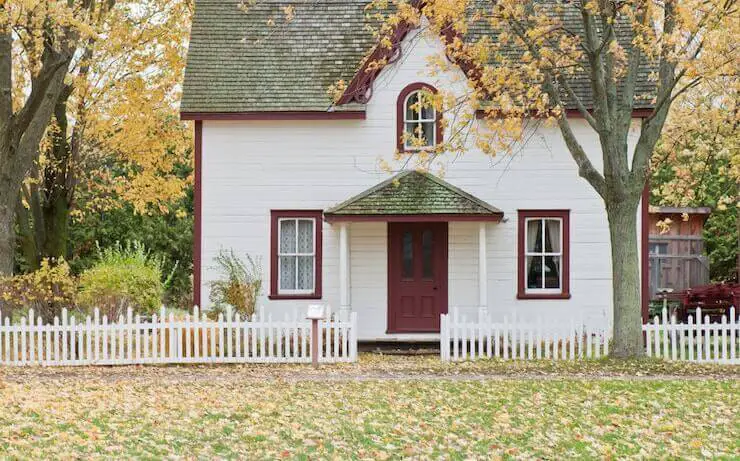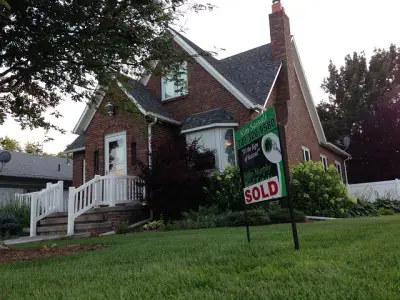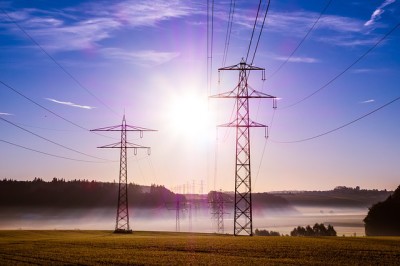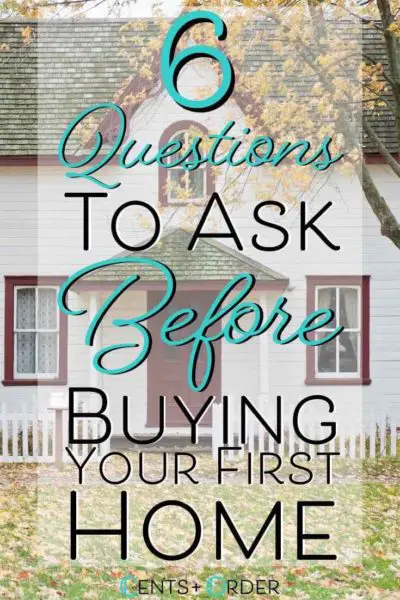There’s so much to think about when buying your first home! How do you know if you should buy a house or if it’s even the right time? Making the leap to home ownership can be scary and exciting all at the same time.
Consider these six questions before you buy your first house to ensure you are financially prepared for the costs of home ownership.

Table of Contents
Before buying your first home, you should ask yourself these six questions:
1. Have you saved a down payment?
The typical down payment on a home is 20%. There are programs that allow you to buy a home with a smaller down payment, but you’ll want to check with your lender if PMI is required.
PMI is private mortgage insurance, which protects the lender in case you don’t pay. PMI can add a couple hundred dollars to your mortgage payment amount. Most loans (other than VA-Veterans Administration loans) require this if you don’t have the full 20% down.
2. Will you be happy in the same house for many years?
Realtors charge 5-7% to sell a house. Unless you are in a hot real estate market, it will take time for your home to increase in value enough to cover this cost.
The last thing you want is to sell a house and walk away with less than you put in as a down payment. Or worse-if you didn’t have much of a down payment, you could have to bring money to cover this fee.
Consider:
- Are you planning on having children? Will there be enough room for a growing family?
- Are your children growing up? Maybe you’ll want a smaller space when your children leave home.
- Do you have aging parents that may need to stay with you?
- Do you like the neighborhood/area? Is there other families similar to yours? If you have kids, are there other kids in the neighborhood? And if there isn’t other kids, are you okay with that?

3. Are you handy (or not handy)?
If you (or your spouse) are handy, then you know you can tackle home projects as they come up. If you are not handy, then consider what will happen if something goes wrong with your house that requires repair.
I ended up choosing a newer home instead of one of the older home neighborhoods for this very reason. I don’t have a handy bone in my body. At least with a newer home, I hope there will be less maintenance issues to tackle.
Even if you are not handy, don’t let that deter you from buying an older home if that’s what you like. Just make sure you are able to afford paying someone to fix things if/when they break.
4. What will it cost to live there?
Even if you have no problem affording the mortgage payment, don’t forget about other ongoing expenses.
What are property taxes and insurance rates? These are usually added into your monthly mortgage payment. Depending on where you live, these can add a big chunk of change to your payment.
Different areas can have widely different property taxes. Property taxes in my area now are SIX TIMES what I paid for a similarly priced home in another state. They make up a huge 30% of my monthly payment.
You’ll also want to consider utility costs. Your realtor can ask the current homeowner for this information or you can call the utility companies and they should be able to give you historical info. Realize that the previous owner might be more or less energy conscious than you.

If you’re buying a condo or townhouse, there is usually homeowner’s association dues (some home neighborhoods have these too). Be sure to see what costs these cover-some of your utilities may be included.
5. Do you have what you need to furnish and care for a home?
Once you own a home, you will be the one responsible for upkeep. Don’t forget to leave room in the budget for expenses like a lawnmower, tools, snow removal equipment, and a ladder.
Do you have furnishings for the home? Curtains/blinds, wall decor, and furniture are just a few expenses that may pop up.
6. Do you have an emergency fund?
If you are buying a home, you NEED an emergency fund. How will you pay for repairs when something goes wrong? When you rent, it’s easy, a quick call to your landlord will get a repair completed.
When you own a home, it’s your problem to take care of. It always seems that a problem either happens at the worst time or multiple problems all happen at the same time. A basic repair might set you back $100, but what if you need a new water heater or furnace?
Are you ready to buy your first house?
Home ownership is a serious investment that can come with unexpected expenses if you are unprepared. Consider the neighborhood, your life plan, and whether you can afford all aspects of home ownership before you buy your first home.

